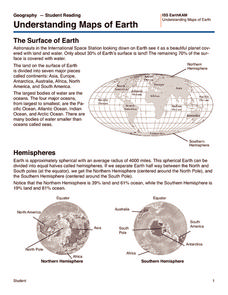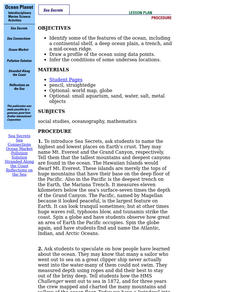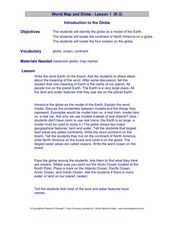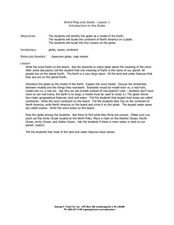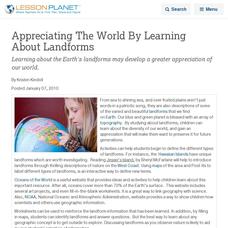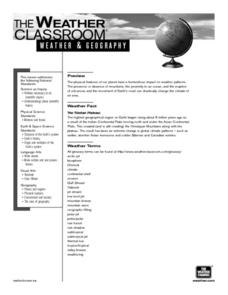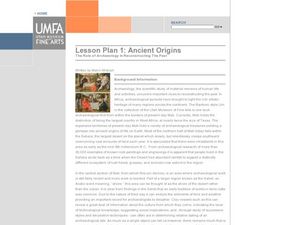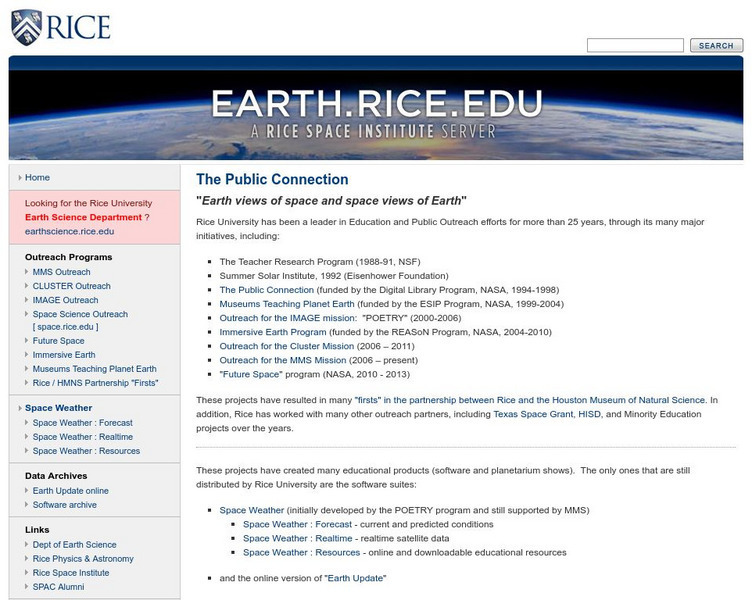Curriculum Corner
Earth Day Book
This Earth Day, celebrate our beautiful planet with an activity book that challenges scholars to show off their map skills, complete a crossword puzzle, write acrostic poems, alphabetize, and reflect on their personal Earth-friendly habits.
Institute for Geophysics
Understanding Maps of Earth
Here is your go-to student resource on primary geography concepts, including facts about the surface of the earth and its hemispheres, latitude and longitude, globes, types of maps, and identifying continents and oceans.
Curated OER
Geography Lesson Plans Using Google Earth
Geography lesson plans using Google Earth, or other interactive websites can make this topic current and interesting for students.
Curated OER
Ocean Planet: Sea Secrets
Students identify ocean features and draw a profile using data points on a map. Through discussion and research, they discover the importance of oceanography and plot a profile of the ocean floor in search for a vessel full of precious...
Curated OER
Where in the World is Hawaii?
Students compare a globe and a two-dimensional world map and explore how they both represent the planet Earth. They locate the Hawaiian Islands on the globe or the world map and describe how the geographical position is unique.
Curated OER
When a Map Isn't A Map...
In this maps worksheet, students read about the Earth, sky, rivers and lakes, and more, and then answer short answer questions about it. Students complete 3 questions.
Curated OER
Deep Blue: Exploring the Deep Ocean
Students examine landforms. In this social studies lesson, students bounce a beach ball around in order to discover that seventy percent of the Earth is covered in water. Students
Curated OER
Oceans and Weather
Students analyze the impact the ocean and its currents have on weather. In this oceans and weather instructional activity, students analyze data comparing inland and coastal weather, and analyze satellite data for evidence of El Nino.
Curated OER
Introduction to the Globe
Students investigate how to use a globe. In this map skills lesson plan, students define what a globe is and locate the various continents on the globe. Students are also asked to locate the four oceans on the globe.
Curated OER
Great Explorations: To the End of the Earth and Beyond
Young scholars analyze the factors that affect exploration such as religion, trade, territorial expansion, and science. In this Great Explorations lesson, students determine the names of famous explorers as well as their routes and...
Curated OER
The Climate Change Skeptic's Argument: Natural Solar Cycles or Human Activity?
Teachers explore patterns in sunspots and total solar irradiance to understand the counterpoint to the human effect of global warming. In this professional development tool, teachers work through a lesson on the sun's natural...
Channel Islands Film
Island Rotation: Lesson Plan 1
How do scientists provide evidence to support the theories they put forth? What clues do they put together to create these theories? After watching West of the West's documentary Island Rotation class members engage in a series of...
Curated OER
World Map and Globe - Lesson 1 Introduction to the Globe
Students explore the earth with maps and globes. In this map lesson, students use maps and globes to locate oceans and continents.
Curated OER
Continents and Oceans on the Move
Students create an awareness of the vast percentage of water covering the earth. They relate similarities/differences between topographical maps and other maps of various time periods. Students examine how to use a topographical map.
Curated OER
Antarctica
Students explore why Antarctica is so important to the planet. They investigate the physical characteristics. Students create their own unique treaty of governance for Antarctica and discuss how laws are enforced in Antarctica.
Curated OER
Appreciating The World By Learning About Landforms
Children can learn about the Earth's landforms and develop a greater appreciation of our world.
Curated OER
Sea Connections
Young scholars, after locating different marine habitats on a globe, play a card game about ecosystems, food webs and organisms.
Curated OER
2nd Grade - Act. 22: The World Game
Second graders play World Game to become more familiar with continents, oceans, countries and states.
Curated OER
The Tibetan Plateau
Students discuss the characteristics of the biosphere, with a focus on the Tibetan Plateau. They participate in a question and answer period discussing biomes and climate patterns. They compare and contrast different ecosystems.
Population Connection
Meeting Human Needs
How to meet the needs of people around the globe—a question many ask. The fifth in a six-part series about human population and its effects on the globe, the eye-opening lesson includes discussion, a homework activity, and an in-class...
Curated OER
Compass Building Instructions
Students build their own compass following a given procedure. In this technology lesson plan, students explain how a compass is used in navigation. They trace the history of its development.
Curated OER
Climate Change
Young scholars discuss problems associated with a world climate change. They examine how animals would be affected if the world heated up.
Curated OER
Ancient Origins: The Role of Archaeology in Reconstructing the Past
Students read information about the ancient origins of art and archaeology with a focus on the Malian culture. In this art origins lesson, students read background information for the topic and compare ancient and contemporary objects....
Rice University
Museums Teaching Planet Earth: Hydrosphere
This tutorial looks at the hydrosphere, that component of the earth that is liquid water such as rivers, streams, oceans, and so on.

